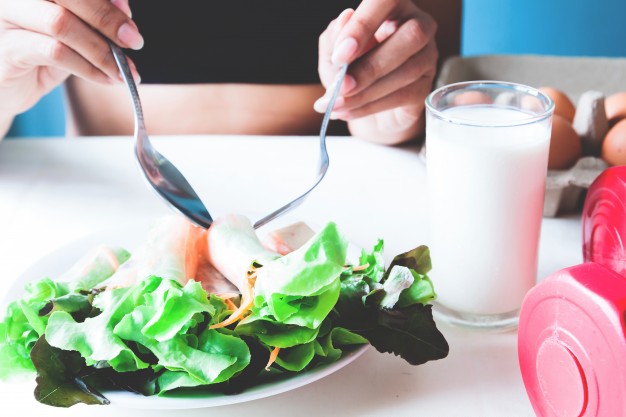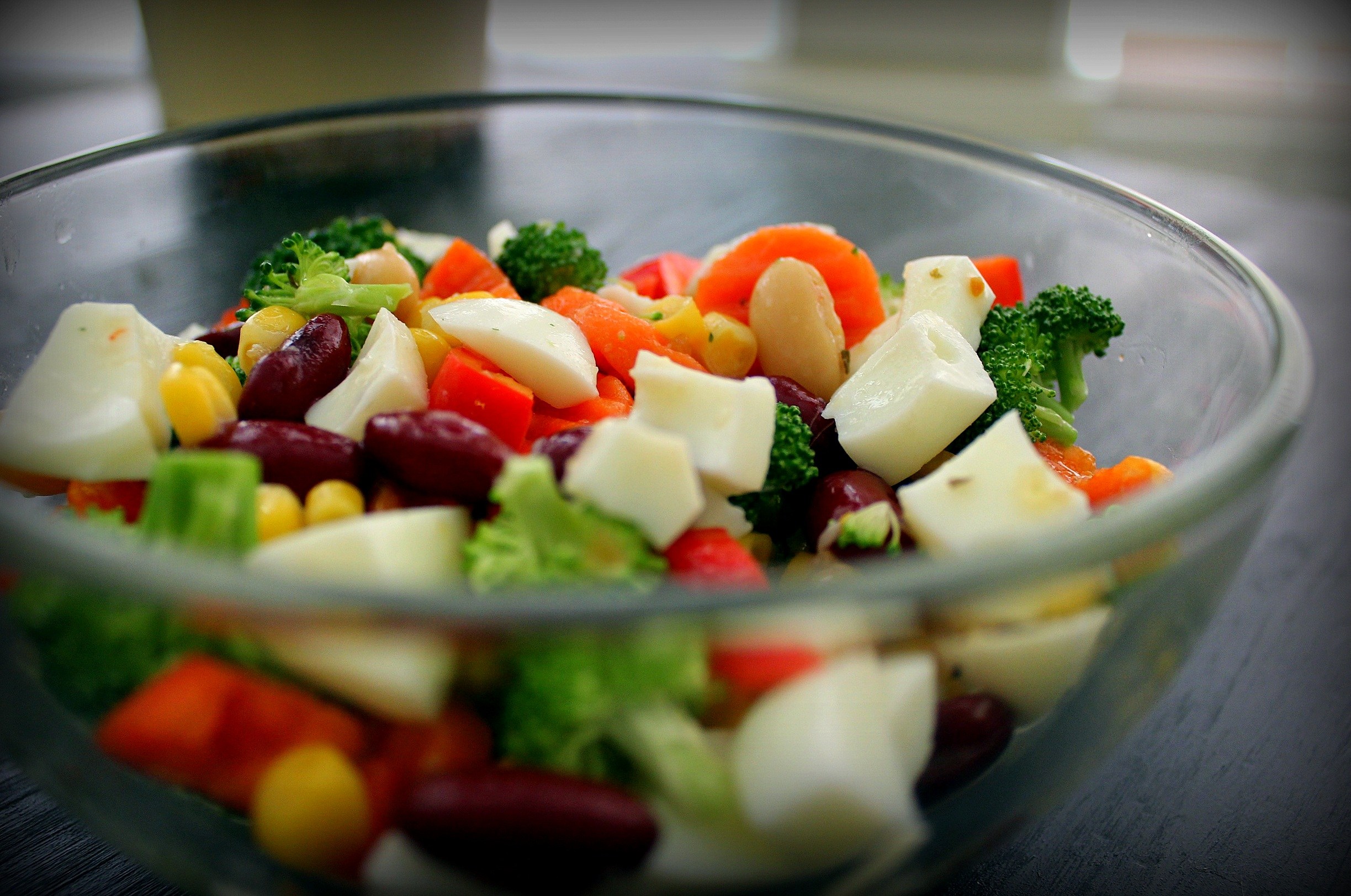Dear Pooja,
With Diwali just over, I know I have sinned with my eating and exercise. How do I make up? How do I pick up all the efforts where I left off?
To err is human, right? Well, to fall off the wagon is expected of many but the intensity and gravity to ‘want’ to get back on is that demarcates achievers from the non-achievers. Clap, roll and drums to those who resisted the temptations the week had to tickle and tempt us with – really will power and motivation is an acquired skill, the more you practice the stronger and more successful you get with it. But the cause to get back on track is also noble and commendable (many lose the way just about here) and good part is that it is not difficult to do the same. The first efforts I’d focus on are to get the total oil/fat intake of the day in control. Be more vigilant in the kitchen if maids are cooking or better still you take the initiative – this is the backbone to controlled calorie intake per day. Ensure an hour (or may 80mins/day) of cardiovascular activity at least 4-5 times a week – regulated output is the best way to burn the ‘cheats’ committed during the festivities. Regulate, control or avoid any more outside food eaten for the coming week or so – do remember however hard you try the oil quota is difficult to control when you dine out. The key to ‘pick the bus’ where you left off is the keen desire and wiliness to forget the errors and start back immediately – the longer you wait to ‘start back’ the more difficult it is – so for all those (and I’m sure the numbers are a vast majority) who slipped – pull up your socks – you erred but now lets make up, be more vigilant, more committed, more dedicated to cause of getting healthier and slimmer cause ‘where there is a will, there is always a way!’
January. No month bursts with as much promise as this one. A fresh start to the year, a clean slate. It’s when gym memberships increase, when resolutions to get healthier spike. But come June or July -or even February or March -and your enthusiasm dims… till it’s December again.
AGAIN
Why does this cycle repeat itself? What is it about new year resolutions -especially the ones that seem to be made for fitness -that fail? I think the answer lies in not just understanding your body but also your mind.
UP AGAINST AGE-OLD HABITS
If you have never -or barely -exercised in the previous year, you can’t expect to suddenly hit the gym six times a week, and subsist on kale, lettuce and fresh air when the clocks turn over from December 31 to January 1. Your body doesn’t understand calendars, it understands repetition eat healthy long enough, exercise regularly, and your body slowly begins to form healthy habits and expects, sometimes even craves, a lifestyle that’s leaner and greener.
SEEKING INSTANT GRATIFICATION
Changes that stick are changes that you introduce gently, patiently and systematically. Good habits take time to form. And how much time it takes varies from body to body. Your body and mind will take time to adapt to your new lifestyle. At times, this may frustrate you because your unfit habits try to latch on for as long as possible.
Pick yourself up everytime you slip. Make a fresh start. You may fail a 100 times, but you need to succeed just once to get yourself going. Setting new habits is one of the hardest things to do. Also, the time frame to reach a healthy goal varies from person to person. Some bodies respond quickly, some take time. But everyone always gets there.
YOU HAVEN’T PLANNED WELL
Fitness and weight loss require planning, thought and organisation. Have you selected the right meal plan that fits your existing eating habits? Do you have access to healthy ingredients? Are you prepared with healthy snacks in your bag in case you feel hungry during the day? If you are a working professional or can’t cook, do you have the support system or arrangement to get healthy food?
Have you chosen a fitness programme group that’s right for you (not too advanced or strenous)? Is the gym too far away from your home or office?
You need to make access to fitness convenient for you. You don’t fit your life to fitness, you have to fit fitness into your life. It’s called the battle of the bulge because it takes time and hard work until fitness becomes a permanent part of your life. Remember that it is not you against someone else it’s you against you. If you set your own bar and compete with yourself, you will always win because it’s your race. On your terms.
We know how fat gets into our body. We eat cakes laden with cream, samosas laden with oil and malai kulfi laden with, well, malai. Food high in fat is a sure way for fat to eat its way into ou body through our mouth, sit in places we do not want it to sit and stay stubbornly put until we do something about it. But do you know how fat leaves the body?
What happens when the extra jiggly bits on your arms, your thighs, your abs start looking slimmer because you have been working out or dieting, or both? What happened to the excess fat that you had accumulated? Where has it disappeared? Any guesses? Surprisingly, not many qualified doctors, nutritionists and fitness trainers know the correct answer. Welcome to The Big Fat Mystery.
WHERE DOES THE FAT DISAPPEAR?
To understand where fat goes, we first need to understand what fat is.
Fat tissue is composed of lipids biological molecules made up of compounds of hydrogen, oxygen and carbon that store energy in their bonds. When we exercise or make successful attempts to burn fat, the molecules are broken apart, the enerd gy stored in these l bonds is released.
But when this hap pens, where does the extraneous `padding’ that lines our bellies and bums go? r Well, while the energy is released, the hyg drogen, carbon and oxygen in those molecules still remain in your body.
What , becomes of them?
How do they get released?
The same way they came in. We exhale it. Biolo gists at the University of New South Wales (Australia) have now conducted in-depth research on where the mass of your fat goes after you burn it inside your body. For every kilo of fat you burn, 80 per cent of that mass is released as carbon dioxide when you exhale. The rest of the 20 per cent is released through wa ter urine, sweat or tears, if you really hate to exercise.
FACT OF THE `MATTER’
Why this happens is quite simple really. Remember, matter cannot be destroyed it can only change form. For example, ice and steam are just changed, altered states of water. In other words, if we accumulate fat in terms of actual physical visible fat, it needs to change its form to another if it has to be expelled during the burning process.
And why does this matter? It’s good to understand what happens to the fat that you are burning because when you are on that treadmill, huffing and puffing away, you will know that every breath you exhale is a sign of fat leaving your body, and that you are inching closer to losing those inches.
When you are exercising at a pace that’s optimal for fat burning, know that the sweat you see on your clothes is not just sweat, and exhalation is not just exhalation.
It’s a sign that a particular mass of fat has truly been expelled from your body. And depending on how disciplined you are -it’s not going to return soon.
You’ve been married for a few years and you feel it’s time to get pregnant.
You’d like to increase your chances of fertility. What should you do?
FOR STARTERS, EAT RIGHT

The National Infertility Association in the US recently stated that almost 30 per cent, or nearly one-third, of infertility cases are due to `weight extremes’, i.e., where the woman is either excessively overweight or underweight. This matters because even a five per cent reduction in weight can improve chances of having a baby. That’s what the study revealed. And, at the other end of the spectrum, women with a BMI (Body Mass Index) of less than 18.5 could have problems with ovulation or menstrual cycles, and by extension, conception.
In other words, there is a definite correlation between nutrition and fertility.
Can you eat your way into pregnancy?
In short, `yes’ (all other indicators being normal), but the answer is also two-fold.
First, a sensible diet -and here, I stress on sensible -will reduce your weight if you are overweight. Protein, fats, carbs, vitamins and minerals must be represented in their recommended quantities for you to nourish your body and lose weight at the same time. Fad and crash diets will starve your body of crucial nutrients that are needed for conception.Please note that, like breathing or digestion, conception is also a bodily function that needs adequate nourishment.
Second, it’s not just eating right, it’s also about eating smart. There are foods that boost ovulation. Iron-rich diets -foods like beans, eggs, dals, whole grains, spinach -reduce the chances of ovulatory infertility. And while folic acid doesn’t boost fertility, it is vital for the prevention of neural tube defects.
Note: The neural tube is what ultimately develops into the baby’s spine and brain 3-4 weeks into the pregnancy a time when most women may not even be aware that they are carrying a baby.
Additionally, a group of Harvard researchers has created the `fertility diet’, designed to boost fertility, bringing about a 66 per cent reduction in risk of ovulatory infertility for those who suffered from it, and an additional 27 per cent reduction in the possibility of infertility from other causes. Key elements of the diet include…z Less bad fats, like trans fats, and more good fats like menstruated fats (olive oil and avocados) z More vegetable protein, like dals, and lesser animal protein (chicken, mutton, pork etc) z More fibre z Multivitamins z More vegetarian sources of iron as opposed to non-veg sources.
MEN, WATCH YOUR DIET
And it’s not just the women. Men need to keep a watch on their diets too. Aspiring fathers also need to maintain their weight and eat right because male obesity impacts testosterone and other hormone levels. In addition, low sperm count and low motility are conditions that are more common in overweight and obese men.
There’s nothing strange or different about eating for fertility. Watch what you eat, watch your weight and watch yourself as you create a new life and with it, induct yourself into one of the world’s biggest societies: parenthood.
At this time of the year, what’s colder than the nip in the air is usually that chill running up and down your spine: whether a student or a parent, ’tis not the season to be jolly. Because it’s exam time.
When it comes to February-March, nutrition rules are flung out of the window. Comfort food replaces regular meals and overindulgence replaces common sense. The need for emotional eating is understandable as is the natural gravitation towards fattening and sugary meals. They provide students with a warm hug when they need it the most. But it’s also harmful.
Remember, exam nutrition is not about counting calories. Poor nutrition is detrimental to one’s ability to concentrate, retain and perform well under pressure. So, nutrition during exam time is simply about harnessing the best of what food can offer so that the body functions at its optimum level.
NIX THE JUNK
Avoid giving your child too much comfort food; try to ration it out. Rich, heavy foods are harder to digest and divert blood from the brain, which is needed the most by the digestive system during this time. Your brain needs blood because it brings oxygen with it, vital for its efficient functioning. That’s one of the reasons why students retain far more information early in the morning compared to later in the day. Because there’s very little to distract blood from going to the nervous system.
PUSH FOR PROTEIN
Protein works beautifully in helping the brain both retain information and recall it. Give your child good lean protein like dal, eggs, fish, chicken and quinoa, to help him or her get the best out of their prep.
CAFFEINE
While it seems like a knight in shining armour, the lesser the dependence on caffeine, the better it is for your child. Most parents don’t know how many milligrams of caffeine is safe to be given to a child, and that in itself is tricky to estimate because it differs from person to person. Forget children, sometimes caffeine levels are hard to estimate even for adults. An overdose of caffeine induces side-effects like loose motions, palpitations, and sometimes, even more serious ones like respiratory distress, vomiting and convulsions. Too much caffeine could also be counterintuitive to the exam process as it could bring about an inability to focus and concentrate. Common caffeine sources include energy drinks, black teas, coffees and caffeine tablets.
WATER
Adequate hydration is crucial for the proper functioning of the body, including the brain, and dehydration could bring with it headaches and tiredness. At least 8-10 glasses or 2 litres of water is recommended every day.
SLEEP
While this has nothing to do with nutrition, if you don’t sleep, your brain doesn’t work well. When you sleep is when your brain organises everything you have taught it, so that when you are awake, it functions almost like a jukebox. The fewer hours you sleep, the lesser time your brain gets to organise its short-term and long-term memory.
In short, pass the nutrition test, and you’re off to a flying start.
Whether it’s weddings, family functions or just dinner with friends, food is often tied to a host of social obligations. It’s difficult to say no when someone offers food. They may feel bad, insulted, if it’s a wedding… The goal of eating is to feel better, not guilty, afterwards. If you eat under pressure, you will not enjoy your food nor stick to your health goals. How does one tackle such situations?
We’ve devised some tactics to confront these tricky situations.
PREPARE
Tank up on soup and salad before going out. You’ll feel full and won’t end up overeating, and you can stick to a few small portions of the healthy options. Also, if the diet doesn’t come to you, bring the diet to your friends. Take salads and other low-cal dishes to the next party and put them on the table next to the creamy dips and fried food. That way you can still eat healthy for most of the evening and your host will appreciate the effort you have made. Everybody wins.
APPRECIATE
When someone wants you to eat food they have prepared, what they really want is for you to appreciate the effort they have made. You could say things like, “You have really outdone yourself this time, the place, table and food look fabulous! “ or “You are such a wonderful hostess! I am having a great time! “ Also, compliment the food early, and often. The more you compliment the dishes, the more people will think that you have eaten a lot even when you haven’t (*wink*).
POSTPONE
This is an especially good tactic for dessert. Postpone eating rich desserts by saying that you are full now so you will eat it in a bit when you can really enjoy it. Chances are your host will not ask you the second time around, as he or she will be preoccupied with other guests. But if they insist, you can ask if you can take the dessert home with you. Whether you eat it at home or not is your little secret.
ASK
Tell your host beforehand that you are on a healthy eating programme, and that you might not be able to eat much at their house. It’s always better to enlist the support of your family or friends when you are trying to lose weight. Tell them you would appreciate their help. They will be much more obliging to help you along your weight loss journey.
“I have been to every dietician under the sun but nothing works. I’m sure you are very good… but I have no hope. “
My new client and I had clearly got off to a good start.
Cases like Tanya’s are not unfamiliar to me. She had lost almost all the weight she needed to, and only the last 6 kilos were left now. But due to her slowing metabolism, and the fact that she had already lost a considerable amount, she was finding the last mile the hardest to cross. Based on her blood tests and eating habits, I charted out a meal plan and told her to come back in four weeks.
But when she came back, she hadn’t lost a single gram.
I frowned a frown I usually reserve for those clients who have spent their weekends undoing the week’s hard work. I had no doubt that Tanya followed everything I outlined to the T. So why hadn’t she lost weight?
And then, she started to speak…

“I weigh myself first thing in the morning, before a bath, after a bath, before lunch, after lunch, before exercise, after exercise. And my weight has not budged. I’ve hired an expensive personal trainer to complement my diet. I’m so stressed out by this that I can’t sleep. What more can I do?“ When someone weighs herself seven times a day, the person isn’t losing weight to look good or to feel better he or she is obsessed with the idea of losing weight. Tanya has an obsession with weight loss. For her, food equals calories. For her, weight loss was not a way to get to her goal but it was the goal itself. So whenever she ate, her attitude was not “I am fuelling my body and this tastes so good“, it was, “I am eating calories and I need to work this off at the gym“.
I spent almost half an hour talking to her because I had to understand why anyone would weigh themselves seven times a day. I told her that she had to enjoy the same food, without thinking about the calories. And just to prove to her that it was the attitude and not the diet, I asked her to follow the same plan with a happier, positive frame of mind. I told her to go out and have fun. And she was not allowed to weigh herself at all.
Two weeks later, the same plan gave her fantastic results. In just 15 days, she lost the 2 kilos she had been struggling to lose for months.
Same meal plan, two sets of attitudes.
JUST LET IT GO
” Obsession is as un healthy as a crash diet. “
Tanya’s story illustrates the point I have been trying to make this is the only body you have. Learn to love and appreciate it. Don’t sweat over the little things and stop obsessing over every single calorie. The results will come. For some, they come faster. For some, they take a little time. But there is no way that eating healthy will not make you reach your weight loss goals. Remember that.
As you flop on your couch, lie down and stare at the ceiling, you wonder why you are so exhausted. It was not the day that had been longer or more eventful than usual so what’s making you feel so tired?
Summers are one of the biggest causes for energy depletion. The obvious solution, of course, is to drink a lot of fluids: 10-12 glasses a day is not just preferred, it’s mandatory. Mix it up as well. Top up with chaas, nimboo paani, and the like to have a productive day. But that’s not why I’m writing this column. My point is that what and how you eat could also be the reason of your fatigue.

The best way to explain the relationship between energy levels and nutrition would be to understand it in terms of your blood sugar levels. Your blood sugar level needs to be stable through the day for you to feel energetic. Certain foods help keep it stable while others spike it (making you super energetic in the short term) and then send it crashing down (making you feel so tired at the end of the day, that it’s hard for you to even lift your finger), not to mention the temper flares.
Sugary and High GI foods, like cakes, chocolate, sweets, sugary drinks, cocktails, white flour etc., spike your blood sugar. Opt for the following slow-release sugars and eating habits to feel better.
1. FRUIT
You’d be surprised at how beautifully fruit helps you feel energised and active. About three medium-sized seasonal fruits a day -each eaten at different times and at least two hours apart -is a great and fairly unobtrusive way to snack with benefits.
2. FRESH VEGETABLES
Whether you make a salad or a freshly cooked bhaji, eat them as a main dish or include them as a sneaky side show, invite more fresh vegetables in your life. In addition to managing your sugar levels, they overflow with vital vitamins and minerals, which are good for you. During peak summer, I prefer my veggies raw, sans he extra masalas and garlic-ginger paste chop them finely, add some healthy sprouts, chat masala and fresh coriander chutney. Chilled yogurt and rice can be happy adjuncts to make a complete meal.
3. VEGETABLE JUICES
Even unsweetened fruit juices are high in sugar. Vegetable juices work brilliantly to keep your body functioning well. Blend three different raw vegetables in a mixie. Add half the pulp back to the juice, top up with water, and season to taste. Drink daily.
4. GOOD QUALITY PROTEIN
Egg whites and lean protein are key to beating fatigue. Red meats have a lot of saturated fats and the body takes more effort and time to digest it, ultimately making you feel sluggish.
5. BREAK UP YOUR MEALS
Eating every two hours works brilliantly to manage your sugar levels, giving you a moderated supply of energy throughout the day. All you have to do is break up your three square meals into smaller meals; it’s really that easy.
Ingredients:
- 2 egg whites,
- 5-6 mushrooms thinly sliced,
- 2 flakes garlic,
- 1/2 onion finely chopped,
- 1/2 tsp mixed herbs,
- salt and pepper to taste.
Method:
Heat 1/2 tsp oil in a pan.
Add garlic and onion and saute well, then add sliced mushrooms, mixed herbs and salt and saute till done.
Beat the egg whites till soft peaks are formed add salt to taste.
In a frying pan heat the remaining oil add the egg whites when it sets a little put the mushroom mixture in the centre and keep on slow flame till done.
When ready fold the omelet into half and serve.
Ingredients:
- 4 egg whites cut into cubes,
- 1/4 each of red and yellow bell peppers,
- 1 stalk of celery finely chopped,
- few pieces of broccoli
- 1 chopped carrot
- handful of boiled rajma
- handful of boiled corn
- 1 tbsp dijon mustard paste,
- jalapenos to taste,
- salt and pepper to taste.
Method:
In a bowl add all the ingredients together and toss the salad till well coated.
This can be eaten hot or cold.










